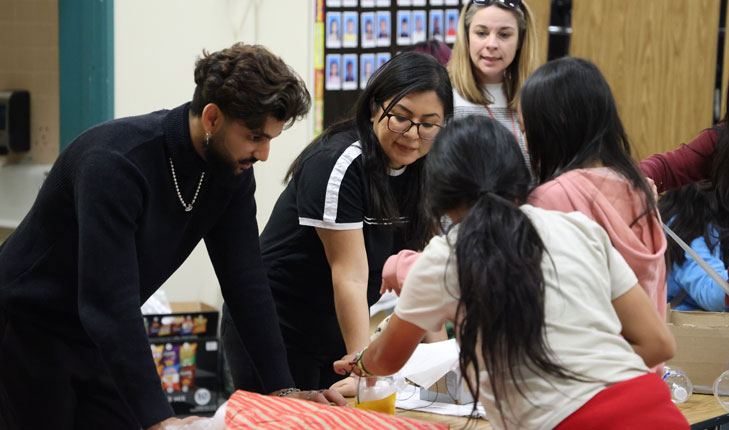Excitement builds as Shawn Bains, a Fresno State senior biology major, climbs to the top of the playground structure at Holland Elementary School for an egg drop.
He teases a throw to the small crowd of elementary school kids eagerly anticipating the first drop of a “parachute” they built in a class project.
“One, two, three,” Bains says as the children’s screams of joy fill the playground as he lets go of the chute containing an egg cushioned by taped-up paper and plastic material.
It lands safely on the ground to a crescendo of excitement from the youth.
For Fresno State biology graduate student Samantha Caldera, the excitement from the simple exercise is surreal and satisfactory.
“It’s really nice to have a full circle moment and to come back and work at the place I was once a student at,” said Caldera, who attended Holland Elementary.
Caldera said such afterschool programs did not exist during her elementary school years.
“We just played until the time our parents came to pick us up,” Caldera said.
Caldera is a student in the National Science Foundation-funded multidisciplinary course Biology 189T (Teaching and Outreach) under the guidance of professor Dr. Alexandra Hansen. Dr. Myung Shin offers a similar course, Liberal Studies 120, in the Kremen School for Education and Human Development at Fresno State.
Hansen said the cohort at Holland Elementary is one of seven school sites around Fresno, where 75 Fresno State students teach 460 elementary school students.
Stacy Her, the program coordinator at Holland Elementary, said the program boosts students’ interest in science.
“I saw how each student’s face lit up as they came to show me the projects they made and explained how they lit up a light or how their robot moved,” said Her, reminiscing about some projects the students completed under the program.
Hansen is optimistic about the course, which she sees as a way to promote STEM (science, technology, engineering and math) across the Valley.
The program is expanding, adding Golden Charter Academy into the list and new undergraduate student facilitators.
“We hope this program will continue to excite our local elementary students about the potential of STEM in their everyday lives and future careers,” Hansen said. “We look forward to offering this program for many years to come.”
Tutoring at Chandler Airport
In the classroom of New Vision Aviation, a non-profit at Fresno Chandler Executive Airport, Fresno State mathematics professor Dr. Tamas Forgacs has assembled a team of mathematics majors to provide one-on-one tutoring to middle and high school students.
Forgacs said he saw a need for the program among his aviation students.
“We use plenty of mathematics in aviation, and the New Vision Aviation students were struggling sometimes with the simplest things,” Forgacs said.
Fresno State students Nipun Amarasinghe, Jose Lopez, Isaac Ramos, Grace Burton and Angel Vargas spend some Saturdays tutoring students in mathematics, physics and science.
Forgacs said the opportunity is also a win for Fresno State students because they get to interact with students from the community and hone their teaching and mentoring skills.
Burton, a graduate student majoring in mathematics who has volunteered for the program for about a year, said she encourages her students not to be afraid to make mistakes.
“When students go to class, they might be scared to ask questions, but with a tutor, they can ask any question about any part of the material they are learning,” Burton said.
Forgacs said, so far, about 25 students have benefitted from the program, which serves students mainly from middle school to high and sometimes college-level students.
Psychology 179I provides students real job experience
A different kind of community engagement occurs through the Psychology Department – a collaboration between Fresno State students and agencies.
In their weekly class meeting, Psychology 179I students share their experience in the supervised professional experience class, a course “designed to give students the opportunity to learn about psychology in its various applied forms through hands-on experience at field agencies.”
The four-unit course, taught collaboratively by psychology professor Dr. Amanda Mortimer and instructor Angela Cooper, requires students to seek an internship and report their experiences during weekly meetings.
“The idea is we get people thinking about where they want to go with their career and get them to do something on the bottom level entry,” Mortimer said.
In the class with Cooper, the students, seated in a circle, discuss their experience in an open forum, raising issues ranging from difficulty finding internship positions to handling workplace conflict.
The course collaborates with the Career and Development Center at Fresno State to assist students with career readiness tools such as creating resumes and cover letters and upping their job interview skills. However, unlike other classes where such training is theoretical, 179I students are required to put what they’ve learned into practice to land an internship for the semester.
After a recent curriculum update, every undergraduate psychology student will now be required to complete an engagement class en route to earning a degree.





